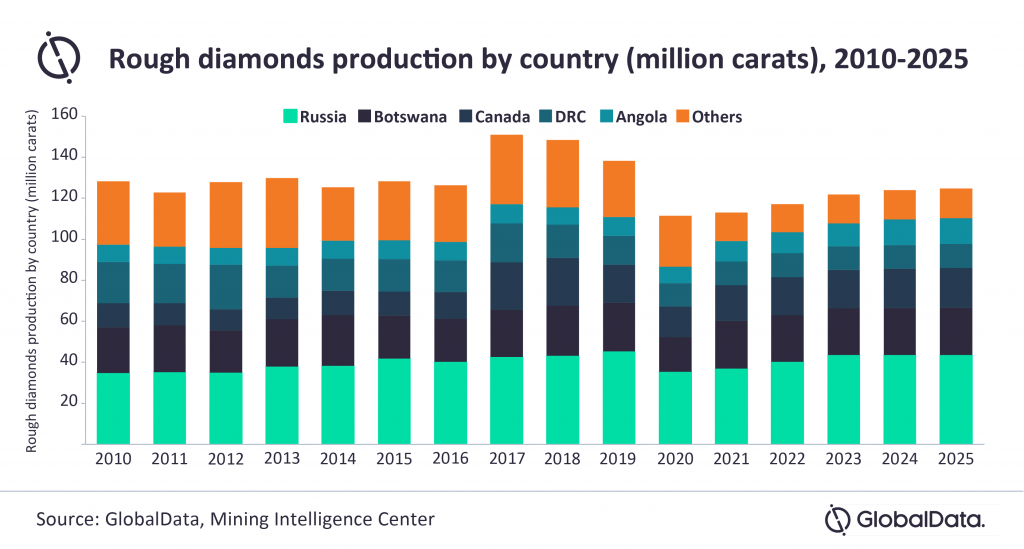Global diamond production to grow by 1.4% in 2021

Global rough diamond production is expected to recover by 1.4% to reach 112.99 million carats (Mct) in 2021, after registering an estimated 19.4% decline to 111.4Mct in 2020, owing to the COVID-19 pandemic, according to GlobalData. The leading data and analytics company notes that significant recoveries in output are expected in Botswana (+37%), Canada (+16.6%) and Angola (+26.3%).
Vinneth Bajaj, Associate Project Manager at GlobalData, comments: “Global output will only marginally increase due to the closure of the Argyle mine in Australia in November 2020, alongside only moderate growth in Russia. Overall, production over the forecast period (2021-2025) is expected to grow at a compound annual growth rate (CAGR) of 2.5%, to reach 124.8Mct in 2025.”
In 2020, the COVID-19 pandemic hammered the global diamond market, which was already struggling due to several factors such as the then ongoing US-China trade war and the political instability in Hong Kong, one of the chief locations for trading diamonds. As a result of the pandemic, operating activities and cross-border movement were severely disrupted.
Bajaj continues: “During Q1 2020 China was the worst affected, however, it was also the fastest to recover after the setback from the pandemic. Chine became a key driver for the balanced global demand for diamonds. Elsewhere, the gradual easing of restrictions improved market conditions and reinforced demand across the global supply chain. Demand in key consuming markets, including the US and China, recovered towards the end of 2020.”
Meanwhile, production in Botswana was affected the most by the pandemic, reporting a significant 28.5% fall to 16.9Mct in 2020. The fall was primarily due to the continued planned reductions in response to the lower demand for rough diamonds caused by COVID-19 and operational challenges at Debswana’s Orapa mine, which led to lower-than-expected output.
Bajaj continues: “Looking ahead, owing to the mines returning to operations and the demand showing signs of recovery, the country’s production of rough diamonds is expected to bounce back, rising by 37%, to reach 23.2Mct in 2021, before declining by 2.2% in 2022, linked to the closure of Damtshaa mine (2022), and then remain relatively flat over the rest of the forecast period. Meanwhile, Debswana Diamond, Botswana’s largest producer, anticipates production recovering to pre-COVID levels between 2021 and 2023.”
Russia, which holds some of the world’s largest diamond deposits, is expected to remain the world’s largest supplier. With potential new diamond mines, Botswana, Canada and the DRC are also expected to remain prominent suppliers of rough diamonds to global markets. Furthermore, Angola will emerge among the top five producers globally, and eventually surpass the DRC to become the fourth largest towards the latter part of the forecast period.
Bajaj adds: “Production in Australia will continue to decline, owing to the depleting ore reserves at the Argyle mine, which commenced in 1983 and then ceased production in November 2020. Given the Ellendale mine is currently idled, Australia’s diamond production effectively ceased at the end of 2020.
“However, the Australian diamond industry may be revived due to the emergence of several mining companies currently conducting various exploration activities to nurture potential diamond deposits. Furthermore, as of May 24 2021, Lucapa Diamond entered into a binding agreement to acquire the Merlin mine from Merlin Diamonds, offering some hope of restarting the Australian diamond industry after the closure of Argyle. Additionally, to attract investments in diamond mining, the Northern Territory government also reduced precious stone’s royalty rate to 5% in July 2020, a 2.5% reduction compared to the previous rate of 7.5%.”

